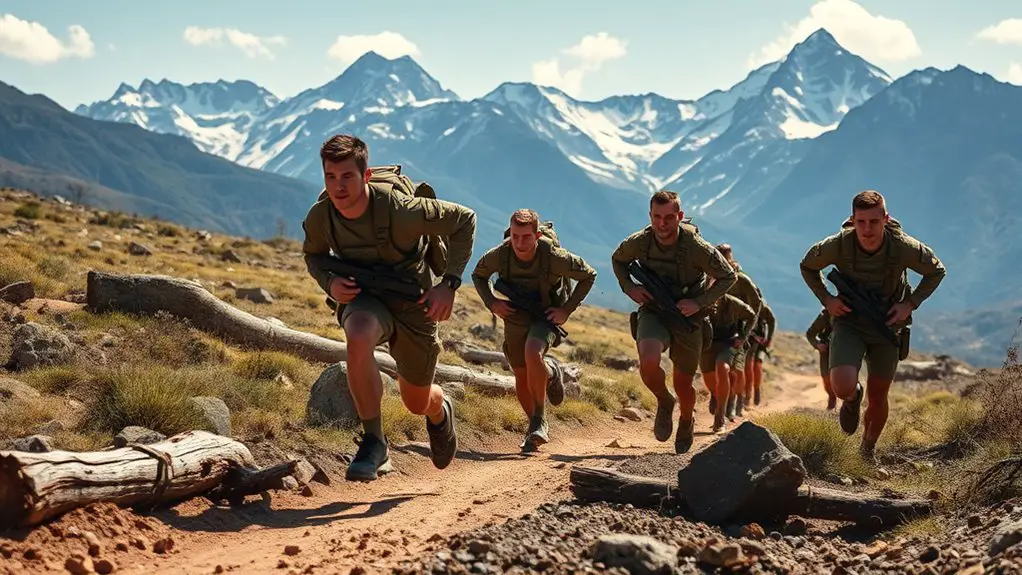To build endurance for Special Forces training, focus on both cardio and strength. Mix steady-state cardio with interval training to boost stamina. Incorporate functional strength exercises like squats and deadlifts for a solid foundation. A balanced diet with lean proteins, complex carbs, and proper hydration is key, along with recovery strategies like stretching and active rest days. Embrace discomfort in your mindset to enhance mental toughness. There's more to discover about optimizing your training and performance.
Understanding Endurance and Its Importance in Special Forces Training
When you think about Special Forces training, it's vital to recognize that endurance isn't just about physical stamina; it's also about mental resilience. Building endurance means pushing your limits, both physically and mentally. You'll face challenges that test your willpower and determination. The ability to endure tough situations gives you the freedom to overcome obstacles and adapt to any environment.
In this demanding journey, mental toughness is as important as physical strength. You need to cultivate a mindset that embraces discomfort and thrives under pressure. By doing so, you not only prepare your body but also your mind for the unpredictable nature of Special Forces operations. Incorporating high-intensity interval training into your regimen can significantly enhance your endurance and overall performance.
Effective Cardiovascular Training Techniques
Effective cardiovascular training is essential for building the endurance needed in Special Forces training. To boost your stamina, incorporate a mix of steady-state cardio and interval training. Steady-state activities like running, cycling, or swimming at a moderate pace help build a solid aerobic base. Aim for long sessions, gradually increasing your distance and duration.
Interval training, on the other hand, pushes your limits. Alternate between high-intensity bursts and recovery periods. For example, sprint for 30 seconds, then jog or walk for a minute. This method helps improve your speed and overall cardiovascular capacity. Additionally, interval training encourages personal expression while achieving fitness goals.
Don't forget to include cross-training activities like rowing or hiking. These not only keep workouts fresh but also engage different muscle groups. Consistency is key, so find a routine that excites you and stick with it. The more you enjoy your training, the more freedom you'll feel in your journey toward Special Forces readiness.
Strength Training for Endurance Building
Incorporating strength training into your routine is essential for building endurance crucial for Special Forces training. By focusing on functional movements, you'll enhance your strength while boosting your stamina. Aim for compound exercises that engage multiple muscle groups, allowing you to develop overall power and endurance. Including exercises like squats and deadlifts can significantly improve your overall strength base, which is vital for endurance activities.
Here's a simple table to guide your strength training:
| Exercise | Sets | Reps |
|---|---|---|
| Squats | 3 | 12-15 |
| Push-ups | 3 | 10-12 |
| Deadlifts | 3 | 8-10 |
Mix these exercises with lighter weights and higher reps to support endurance. Remember, it's not just about lifting heavy; it's about building the strength that'll carry you through those grueling training sessions. Commit to your regimen, and you'll find the freedom that strength brings in your pursuit of excellence.
Nutrition Strategies to Support Endurance
Building strength is only part of the equation; your nutrition plays a pivotal role in enhancing endurance for Special Forces training. You can't push your limits without fueling your body right. Focus on a balanced diet rich in whole foods—think lean proteins, complex carbs, and healthy fats. These nutrients will give you the energy you need to power through grueling workouts.
Don't skimp on hydration, either. Water is essential for peak performance, so keep a water bottle handy at all times. Consider using electrolyte drinks during long sessions to replenish lost minerals. Proper hydration is crucial for optimal performance, especially during intense training sessions.
Timing matters too; eat a meal or snack with carbs and protein about 30-60 minutes before training, and refuel within an hour after to kickstart recovery. Finally, listen to your body. Adjust your diet based on how you feel and your training demands. Fuel yourself to release your potential and embrace the freedom that comes with endurance.
Recovery and Injury Prevention for Sustained Performance
While you might be pushing your physical limits in training, recovery and injury prevention are equally vital for maintaining sustained performance. Your body needs time to repair and adapt, so listen to it. Incorporating rest days into your routine isn't a sign of weakness; it's a strategy for long-term success. Use active recovery methods like light jogging or yoga to keep blood flowing and muscles loose.
Pay attention to any signs of pain or discomfort. Ignoring these signals can lead to serious injuries that could sideline you for weeks. Stretching and foam rolling are your best friends; they help alleviate tightness and enhance flexibility. Additionally, embracing rest days is key to accessing true potential and maximizing performance.
Hydration and nutrition play an important role in your recovery, too. Fuel your body with nutrient-dense foods to support muscle repair. Prioritize sleep, as it's when your body does most of its healing. By balancing hard work with proper recovery, you'll maximize your endurance and stay mission-ready.
Frequently Asked Questions
What Mental Strategies Can Enhance Endurance During Training?
To enhance your endurance during training, focus on positive self-talk, visualization techniques, and setting small goals. Embrace the challenge, remind yourself why you're pushing through, and stay present in the moment for better results.
How Does Sleep Affect Endurance Performance?
When it comes to endurance, you can't underestimate sleep's power. It's the fuel for recovery and performance. Without enough rest, you're running on empty, making it tougher to push your limits during intense training.
Can I Build Endurance Without Running?
Absolutely, you can build endurance without running. Consider cycling, swimming, or high-intensity interval training. These activities improve cardiovascular fitness, strengthen muscles, and keep things fresh, allowing you to enjoy the journey while achieving your goals.
What Role Does Hydration Play in Endurance Training?
Imagine your body as a well-tuned machine; without proper hydration, it sputters. Staying hydrated fuels endurance, boosts performance, and keeps you feeling free and energized during your training. Don't underestimate the power of water!
How Do I Track My Endurance Progress Effectively?
To track your endurance progress effectively, keep a detailed log of workouts, noting distances, times, and conditions. Use apps or charts to visualize improvements, and set specific goals to stay motivated and focused on your journey.




